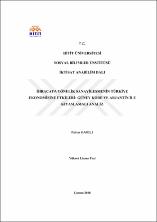İhracata yönelik sanayileşmenin Türkiye ekonomisi üzerine etkileri: Güney Kore ve Arjantin ile kıyaslamalı analiz
Citation
Karslı, F. (2018). İhracata yönelik sanayileşmenin Türkiye ekonomisi üzerine etkileri: Güney Kore ve Arjantin ile kıyaslamalı analiz (Yüksek Lisans Tezi).Abstract
Küreselleşen dünya ekonomisinde finansal piyasaları ayıran sınırların ortadan kaldırılmaya başlamasıyla zamanla uluslararası sermaye akımları da hızla serbestleşme sürecine girmiştir. Bu anlamda birçok gelişen ve gelişmekte olan ülke de sermaye hareketlerini hızlandırmak adına bir liberilazsyon sürecine dâhil olmuştur. Bu uluslararası mal ticaretinin liberalizasyonu ile birlikte seyretmiştir. Birçok gelişmekte olan ülke özellikle 1980'li yıllar itibariyle İhracata Yönelik Sanayileşme Stratejisi ve dışa açık ticaret politikalarını uygulamaya başlamışladır. Bu çalışmanın amacı, Cumhuriyet'ten bu yana Türkiye'nin gelişen sanayileşme deneyimini ana hatlarıyla, ekonomideki yapısal değişimin boyutlarını ve yansıyan kırılma noktalarını derinlemesine irdelemek ve Türkiye ekonomisi üzerine etkilerini detaylı bir biçimde sorgulamaktır. Aynı zamanda Güney Kore ve Arjantin ülkeleriyle kıyaslamalı bir analiz gerçekleştirerek, stratejilerin uygulamadaki faydaları ve zararlarını analiz etmek amaçlanmıştır. Çalışmanın birinci bölümünde, sanayileşme kavramından yola çıkarak; ithal ikame stratejisi ve ihracata yönelik sanayileşme stratejilerine yönelme nedenleri, araçları, sonuçları ve etkileri üzerinde durulmuştur. İkinci bölümde, Cumhuriyet'in ilanından günümüze kadar geçen süreçte tercih edilen kalkınma stratejilerinin ülke ekonomilerine etkileri, dönemler itibariyle etkileri, krizler ve beraberindeki durgunlukların Türkiye ekonomisine etkileri detaylandırılmıştır. Üçüncü bölümde ise, Güney Kore ve Arjantin devletlerinin dış ticaret performansları değerlendirilmiş olup, Türkiye ekonomisiyle bir kıyaslamalı analiz gerçekleştirilmiştir. İhracata Yönelik Sanayileşme Stratejisinde ülkelerin uyguladıkları politikalar, üstün ve zayıf yönleri tespit edilerek, devlet mekanizmasının stratejiler üzerindeki etkinliği tartışılmıştır. In the global world economy, international capital flows bega to liberate rapidly with the elimination of the borders seperating the financial markets. In this sense, many developed and developing countries have also been involved in a liberalization process to accelerate capital movements. This followed with the liberalization of international trade of goods. Many developing countries have started to imllement export-oriented industrialization strategy and export-oriented trade policies especially in the 1980. The aim of this study is to examine the developments in industrialization since the republic of Turkey, the dimensions of structural change in he economy and refractive points reflected in the Turkish economy and to question its effects in detail. At the sometime, it is aimed to analyze the benefits and disadvantages of strategies in implementation by performing a compratire analysis with the countries of South Korea and Argentina. In the first pont of the study, bosed on the concept of industrialization, the roosans, tods, results and effects of the import substitution srtategy and the industrialization strategies for exports were discussed. The second section details the effects of the preferred development strategies on the economies of the country in the period from the republic's announcement to the present, the effects of the periods, the crises and the stagration with them on the Turkish economy. In the third part, the foreign trade performances of South Korea and Argentina were evaluated and a comperative analyses of the Turkish economy was carried out. In the industrialization strategy for exports, the policies implemented by the countries, the effectiveness of the state mechanism on the strategres were discussed.


















